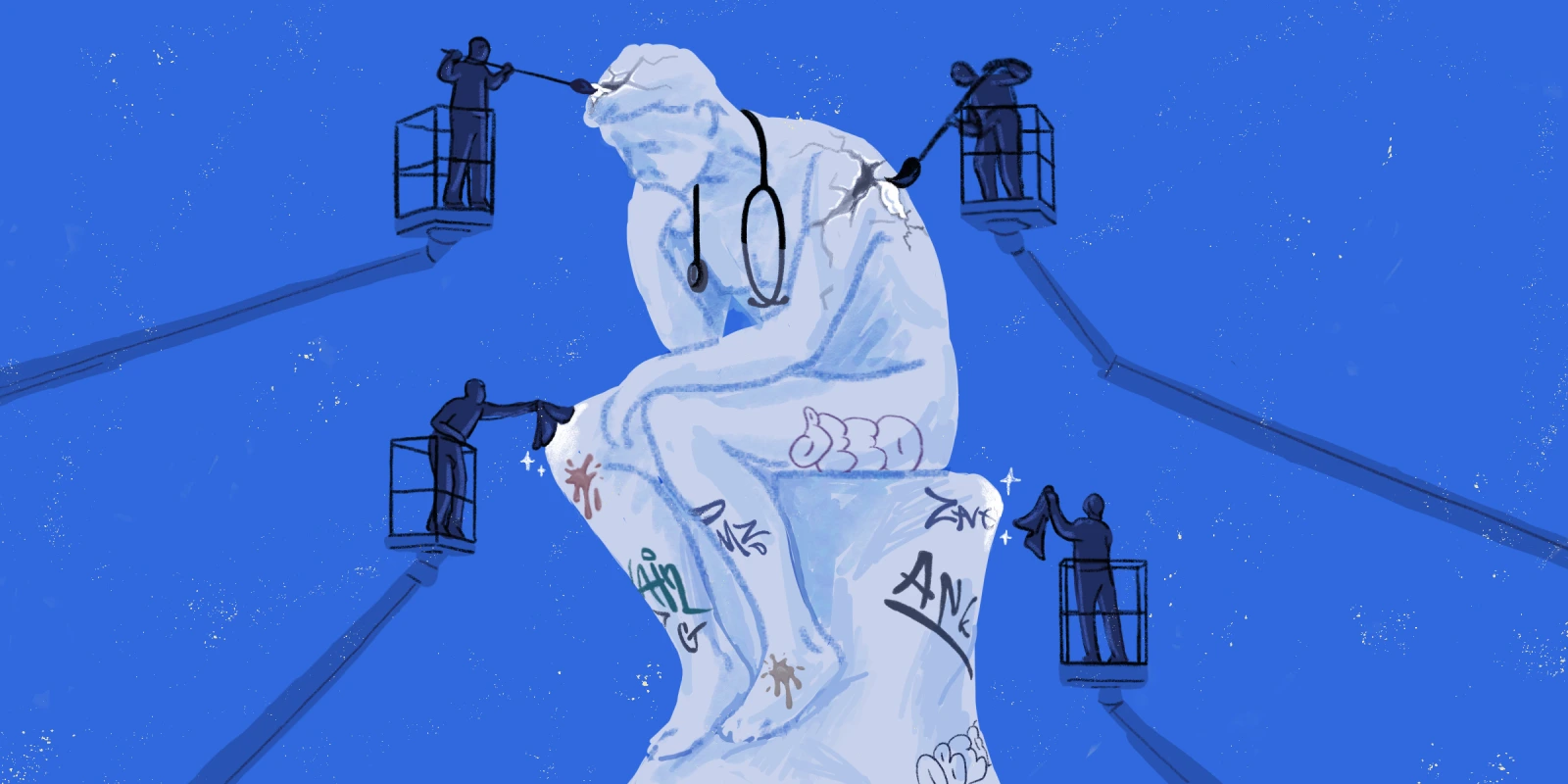One Christmas, I took care of a patient in the ED who had — for HIPAA purposes’ sake I’ll be vague and say — a bad infection. I was working in a community ED over 45 minutes driving from the mothership referral center. This patient had been seen by my colleague a few days prior and accepted for transfer to the main campus for surgical intervention. The patient initially agreed, but when the ambulance arrived, they changed their mind and left against medical advice. My colleague prescribed oral antibiotics, an insufficient substitute, and urged the patient to go directly to the referral center as soon as possible.
The day I cared for the patient, the patient had indeed gone to the referral center and waited in the waiting room for a couple hours. The patient became impatient and drove the 45 minutes north to my community site, so that I could call an ambulance to drive the patient back to the referral center and they could skip the ED waiting room line. In the patient’s eyes, I’m sure this was a logical and simple thing to do, but to me and the dozens of people it affected, it was wholly self-serving. I spent approximately an hour calling multiple teams via the transfer center to find an accepting physician — medicine felt it should be surgery, surgery felt it should be interventional radiology, but interventional radiology doesn’t admit patients, and ultimately, medicine accepted the patient. Then I filled out paperwork to book an ambulance, but it couldn’t be scheduled until a bed was assigned to the patient. There were no available beds, so my patient would have to board at my hospital, taking up an ED bed, until a bed became available at the receiving center, likely not until the next day.
While this is not an atypical process to get patients to the care they need, this whole process had already been done once for this patient, for this problem. This patient forced my hand at repeating the process for their convenience and, in their words, “a private room while I wait.” They effectively took two ambulances out of service for several hours, which in our small, funding-strapped region, could have been detrimental to the community. This patient deemed themselves more important than everyone else waiting to be seen and cared for. While putting on a polite and professional face, I was internally seething at this abuse of our already stretched paper-thin system. I fumed that the patient would ultimately get their private room and their private hospital escort to another private room, bypassing the jam-packed waiting room of equally sick patients and without any recompense to the system that bent around their manipulative will.
On what was supposed to be a holiday of good cheer and good will, I left my shift two hours late, feeling burned out and demoralized. This patient’s behavior is just one example of an infinite number of ways that patients can intentionally or inadvertently cause moral injury to the providers caring for them. As a one-off occurrence, it may not seem like it should significantly impact my fulfillment in my life’s work, but things like this happen over and over again, and the cumulative effect is compassion fatigue that unfortunately, I fear, trickles down, impacting my other patients. There is an entire burgeoning field of emergency medicine that focuses on wellness and resilience, which, to my interpretation, places the burden primarily on the physician to seek out the external help they need. What if there was a way to secretly reflect some of that burnout spirit back in the direction it came from without causing any harm? My proposal is an ICD-10 code for moral injury — an impossibility, but humor my tongue-in-cheek hypothesis for a moment.
In writing our patient encounter documentation, we list our diagnoses and CMS reimburses the hospital at a specific level of service that is voodoo black magic–calculated based on the complexity of the case. If we spend more than 30 minutes caring for the patient AND they have a “real” emergent medical problem, we can submit our critical care time. Typically, this means for things like cardiac arrest, status epilepticus, severe sepsis, anemia requiring transfusion, bradycardia requiring pacing, etc. However, if we spend 30 minutes counseling a worried parent about their child’s viral URI symptoms or funny-looking poop, that doesn’t count — the minimum level of service is billed because the patient wasn’t emergently “sick.” Other factors contribute to the complexity of emergency medicine billing, like some comorbidities that must be considered to care for a patient — severe obesity, uncontrolled diabetes, ESRD, etc. If we add these ICD-10 codes, a higher level of service is billed. In effect, reimbursement is greater when the patient is at greater risk and when we must think harder while caring for them.
Now there are a lot of reasons this is a terrible reimbursement approach — it disincentivizes doctors from spending time counseling patients, and, in some ED groups that tie physician reimbursement to RVUs, it has the potential to disincentivize physicians from picking up the not-so-sick patients. We could go on, but that would be a different essay. The payment system, as it exists, effectively tells us it values us more when we are doing critical or medically complex care — the stuff most of us love, the stuff we actually trained for, and the reason we chose to do emergency medicine — than when we are doing the vast majority of our work.
My quandary with this system is that my time is my time. I can’t separate the time value of my high-level expertise from my low-level expertise. Counseling patients is a different skill than critical care, but I would argue an equally important one. Oftentimes the patients that require the most of my time at the bedside, reiterating, teaching, and counseling, are not my sickest patients. Sometimes they need more time due to a language barrier, or low health literacy, but sometimes it is because they are belligerent, argumentative, and/or entitled, demanding unnecessary tests, or negotiating for narcotics. Because I, like many of my colleagues, in many different specialties, am not willing to sacrifice my bedside personal connection with patients, I do not cut this time short, but consequently, I spend many unpaid hours after my shifts finishing documentation and tying up loose ends. This time cuts out from my personal needs like healthy eating, sleep, exercise, and maintaining personal relationships, which we all know leads to burnout. If my patients were kind and grateful in return, it would be worth it. But when patients behave like the one I described above, who valued their time above the time of all the other patients in the ED, it certainly doesn’t fill me with fulfillment.
Billing for critical care makes me feel guilty. By practicing the medicine that I enjoy most, and documenting it appropriately, I am indirectly increasing the cost to the patient. The mind-boggling levels of complexity with insurance coverage, the ignorance of the actual costs of the procedures I perform and the supplies I use, and the fact that my income is not in any way tied to the services I provide help me avoid dwelling on the patient cost. I can pretend the patient’s insurance will fully cover all of their care and that my documentation is all part of a bureaucratic paperwork game. But then I pay my own medical bills and realize the hospital charges $50 for an EKG, and I go back to feeling guilty. If I spend an hour running a code and the patient dies, I document critical care time, and the family is left with a huge bill and a dead loved one. This feels unjust. Wouldn’t it be more cathartic to bill for my suffered moral injury after an hour of fruitless phone calls on behalf of a rude and self-serving patient, rather than billing for the necessary and meaningful time I spent doing the work I was trained, and expected, to do?
Supplies and equipment not withstanding, my time spent doing critical thinking is equivalent in minutes to my time spent negotiating with condescending consultants or belligerent patients. While the former is meaningful, the latter is degrading. Why is there a different monetary value applied to medically complex thinking as compared to logistically, socially, or emotionally complex thinking? Adding an ICD-10 code for moral injury to my note wouldn’t result in any change to my personal reimbursement, but the silent, some might say passive aggressive, acknowledgement of my frustration just might lessen the psychological burden of caring for the “difficult patient.”
What codes do you wish could be added? Share in the comments.
Dr. Jenny Jones is a global emergency physician in Massachusetts. She enjoys dancing, aerial arts, and drawing silly anecdotal cartoons. She is a 2023–2024 Doximity Op-Med Fellow.
Illustration by Diana Connolly







